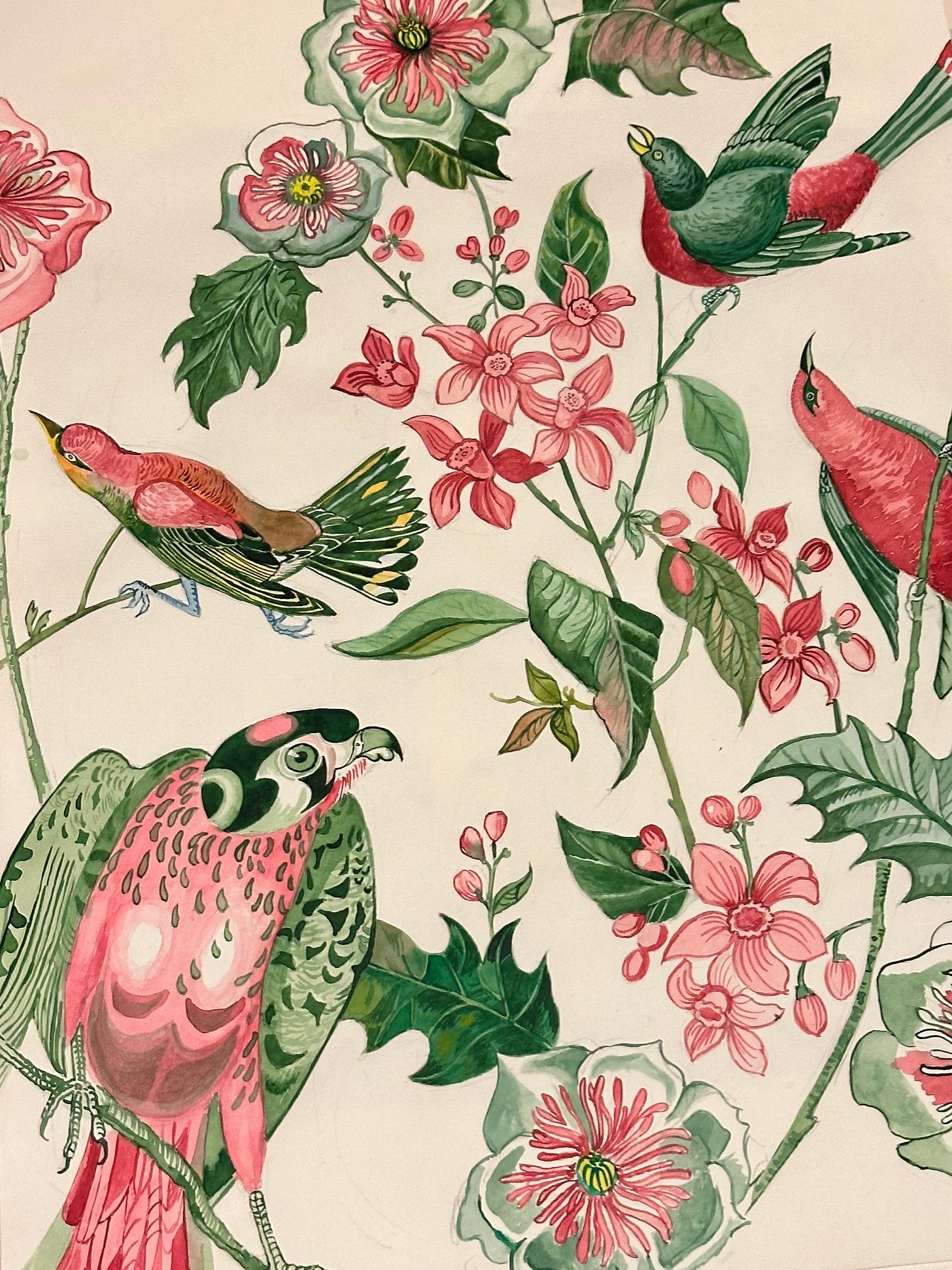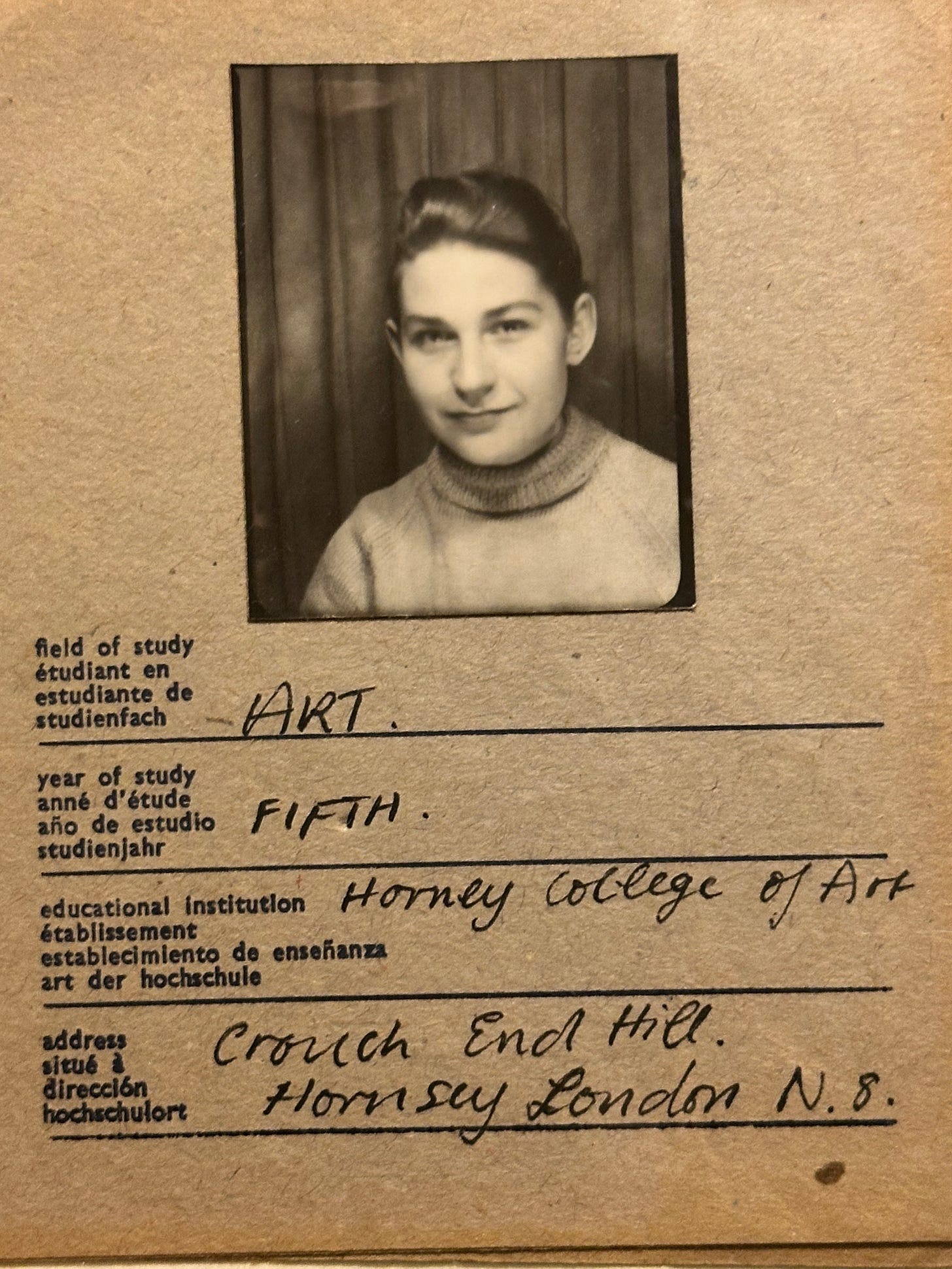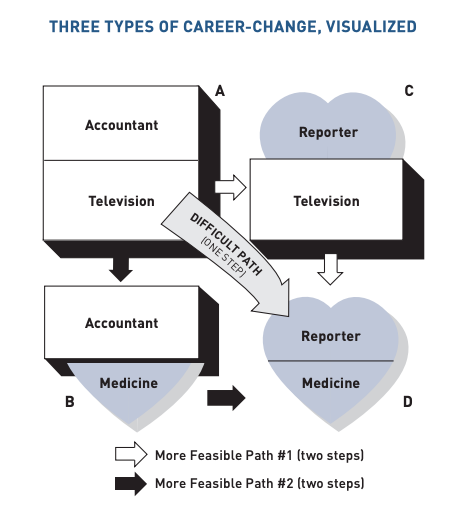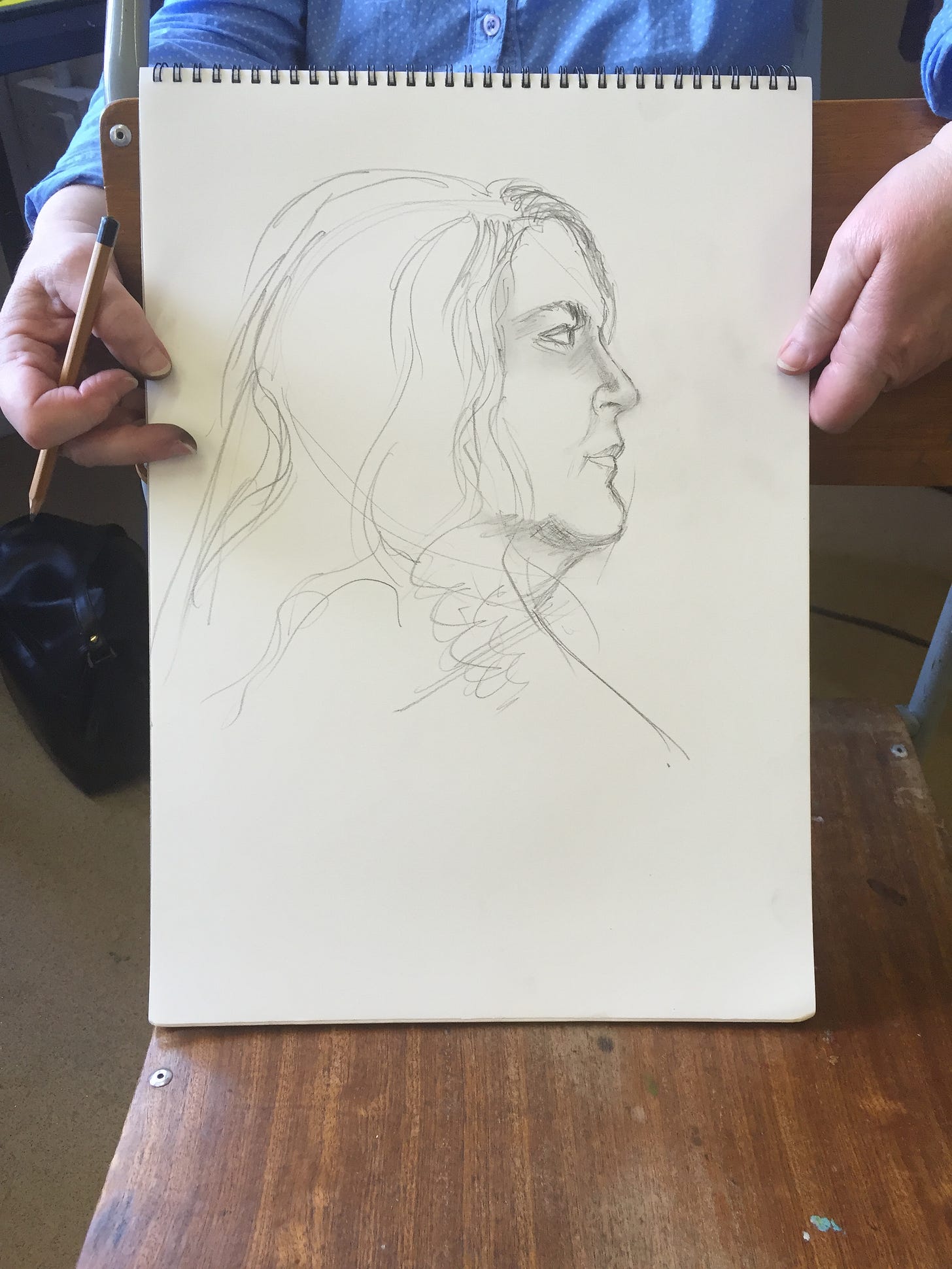making a living vs making a life
or "can you earn money from your art?" (and is that even the right question?)

Here is the best advice I ever received about making a living in a creative field. It’s the best advice I’ve ever heard about it, actually. I got this from my mum. If you are an artist, this is the greatest wisdom I have to offer you:
almost no one can make a full living purely from making and selling their art. but anyone who wants to can make a life in and around the artform they love
I am telling you, if you can really absorb this and make it part of you, it will make the rest of your life better, it will make your art better, it will reduce your envy and resentment, it will increase your basic capacity for joy.
Alright, let’s rewind a bit, and talk about how this works in your actual life. I read this post, which is great, and so heartbroken because Elizabeth Gilbert said that making a living as an artist is almost impossible. I understand it and I also feel sad about it because, you know, Liz Gilbert probably doesn’t intend for every word she utters to land like a hammer blow on someone’s soul. People just say stuff, it’s not aimed at you. But I get it, writing a first novel is incredibly hard and takes such an effort of will every day to keep on and on beating your way with a machete through the jungle of the book while constantly thinking ‘no one will read this, no one will read this, I’m a fool, I should do anything else, no one will read it…’ that it’s… quite easy for ‘person says thing’ to feel like a hammer blow.
And reading that piece made me think: hmm, perhaps not everyone knows the distinction my mum taught me. Maybe not everyone has been taught from childhood that there are many places between ‘making a full living as an artist’ and ‘have to do a boring job 40 hours a week to snatch a few brief hours at their art on the weekend’.
My excellent mum
My mum was a visual artist. This post is illustrated by her works. She started making visual art when she was very young - she always loved drawing, painting, clay sculpting. She and her family were poor; most of her early work was done with pencil and paper or with an inexpensive box of watercolour paints. But she was good at it, and she loved it.
She had to fight hard to go to art school. It wasn’t what nice Orthodox Jewish girls from respectable families did with their lives. She was supposed to get married straight out of school, but she wanted to be an artist. She ended up getting her degree, met Mick Jagger (briefly) when he was at art school in the 60s too, she worked on Carnaby Street in swinging London in the 60s, she worked on some classic ad campaigns, she was the first woman her ad agency had taken on in a creative role! (And I really didn’t understand what that meant until Mad Men.) After she did get married she worked as an art teacher, and a freelance designer, and she rented space in a joint artists’ studio where she went a few mornings a week to paint until her final illness. She left her art materials in her will to that group of artists. She never sold a painting for a large sum. She lived a whole beautiful life in art.

So she used to say that to me: “almost no one can make a full living purely from making and selling their art. But anyone who wants can make a life in and around the artform they love.”
Making a living, making a life
With all respect to Elizabeth Gilbert, how you make your life is a very different question to any of the ideas she’s talking about in this video: jobs, hobbies, careers or vocations1. It’s not ‘get a job to pay your bills while you do your vocational art evenings and weekends’. It’s not ‘turn it into a hobby’. It’s not ‘you must think about this as a monastic religious dedication’. It’s: look, try to make a life you enjoy. You don’t have to have a vocation. You just have to know that you really really love it.
If you love a particular art form - bloody hell if you love anything - you can work to shape your life so that you spend more time around it. Aeroplanes, steam engines, 19th century French industrial policy, plants, animals, cooking, regional accents. Whatever it is that you really love, you can find a way to make a life in it2.
For the arts, you can do it in all the ways that mum did it and a million more. Teaching and commercial work, but there are so many other options. The creative arts are an industry and industries have so many different roles. If you love film, if you want to make films, you should for sure be making short films, learning about film, watching a lot of film, going to film school. But also… think about all the people you see on the credits of a movie. To work around film, you could be:
an accountant working on the finances
a carpenter building the sets
working with the catering
working as a location scout
a lawyer who specializes in film, or an agent
a driver or a runner
These aren’t just ‘get a job’. They are jobs that get you involved in the artform you love. You get to be part of making it happen, you see from the inside how it works. It is the same for every single creative arts industry. If I have a ‘vocation’ it’s certainly as a novelist, but I have also done legal editing, creative writing teaching, games writing, journalism, reviewing, I’ve written courses and edited other people’s non-fiction books. Some of those have been very creatively fulfilling - I adore my games writing, and the community of fans of my game. This is how it works. You put things together that keep you in and around the artform you love.
What I’m saying is really a version of this, from Richard Bolles’ wonderful book What Colour Is Your Parachute?
But isn’t it going to make me feel terrible, being around my artform but not being the star?
Only if you decide to feel that way. Seriously. I suppose this is obvious to me because my mum taught it to me, but I really want to pass on to you the certain knowledge that you will condemn yourself to a life of bitterness if you decide that there is only one role which will satisfy you and that’s top-billing.
Here are the best things about making a life in and around your beloved artform:
you get to spend time with people who also care about that thing. They are your people. They will not look at you weird when you want to talk about art. God, I spent six years of my career working at a law firm, where I was just that person with that weird talent for suddenly quoting Shakespeare. And the relief when I started my Creative Writing MA and was around people who also really really cared about literature.
You get to learn about your thing. If you want to be a director. If you’re on set as a runner you will get to see amazing directors doing their work. If you’re teaching art in school, you will get to break down for students what’s not working and learn more about it for yourself in the process. If you’re doing legal editing you’ll be sharpening your skills at getting a paragraph down to the words it needs, that say exactly what you want it to say and nothing else (I’ve done that one, so I know).
You get to be successful the whole way through. The point is the art. It’s being in your artform. The day when I made my first money from writing was fantastic - I won £300 in a short-story competition and used it to buy a slightly-damaged sofa for my flat from a sofa warehouse. That was great. And I was fully satisfied on the day when I was spending all my professional time on writing. That wasn’t ‘the day my novel hit the bestseller lists’. It was when I gave up editing jobs and my only work was as a games writer and doing other kinds of writing. That’s the win state. If you don’t have ‘working in this industry’ as the win state then you won’t be able to be happy even if you win a big literary prize. You can always look at someone else who’s doing even better than you and feel rubbish about yourself.
And the thing is, it’s not really up to you how your work is received in the world. You make your best work, but then maybe what you’re doing isn’t quite in fashion, or doesn’t quite hit the moment. It’s OK. Just keep making the best work you can. If you make the money the arbiter of success you can always feel like a failure. But if you make the success being in and around the artform you love… if you want it, you can have it.
I think what my mum was talking about is also much more erm British which is another whole topic.
I just want to acknowledge that there are structural barriers that make this harder for some people than others. It’s harder if you’re already coming from a low-income family, it’s harder if your country demands you have a particular kind of job to access healthcare, it’s harder if your face doesn’t fit for whatever reason. I don’t want any of this to come over as my telling you that you *just need to get more grit* or whatever. What I’m saying is: I think aiming for a life around an artform is a better aim than saying that you have to make your whole living there.




I've heard it said that if you want to get rich work with money. My sister has been looking after rich people's money for decades, has lived all over the world and owns a number of properties. Clearly, some of the wealth rubs off on this whose hands it passes through.
I've always loved books and have been working in the book trade for over thirty years. I've been a bookseller, stock controller, proof reader, catalogue copywriter, bookclub advertising writer, book jacket copywriter, creativity and copy trainer. I've written the blurbs for over 5,000 books (including some of yours). Publishing has allowed me to (just about) afford to buy a house and raise a family.
All this time, I've been writing novels, and in under a month my first novel will be published. This book might not have been published. I might still be getting up early to write, as I have for the last twenty years, with nothing but hope to sustain me. But in many respects the book's appearance doesn't matter.
I spend my days working with others who love and create books. I get to play with words and tell stories about books. I find my job immensely fulfilling. And all this because I left university with a degree I didn't want to use and thought it would be nice to be a writer because I liked books. But, because I had no idea how to go about that, I got a job in a bookshop, which was about as writer adjacent as was achievable. Just about anyone can work in a bookshop. You don't need a degree either. Just a love of books.
Thank you for writing this piece. It absolutely describes my life, and hopes. And is a powerful corrective to the twin poles of 'give up the day job' and 'never give up the day job'.
Your mum sounds amazing and her advice is so very wise. I remember reading an interview with you 10 perhaps 15 years ago where you spoke about your job in a law firm - you said that you were very good about climbing ladders, but bad at choosing which ladders. That bit of advice has stayed with me and helped me made the choices for my art-life rather than my ambition for career or money. I love my ladders now.